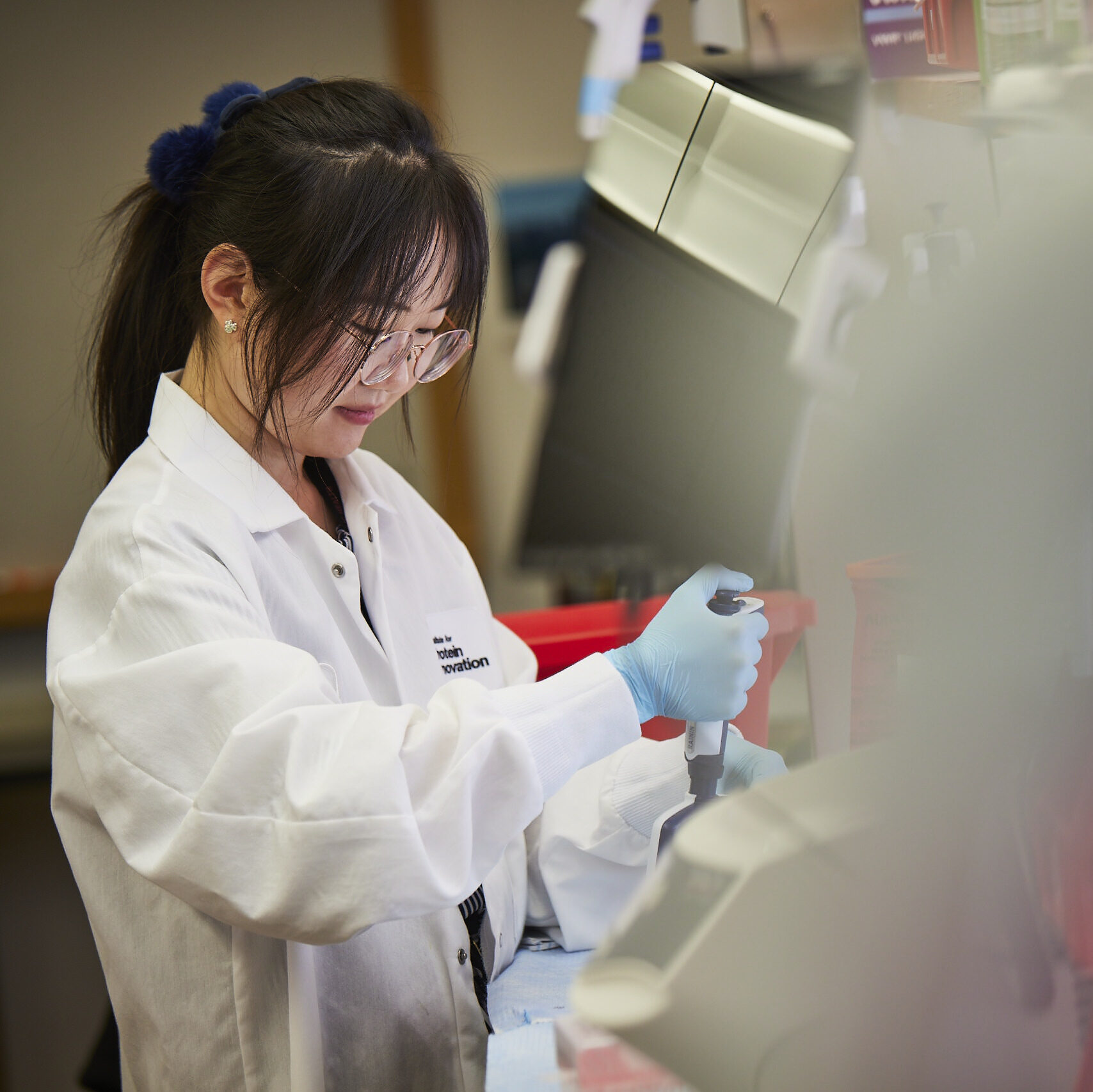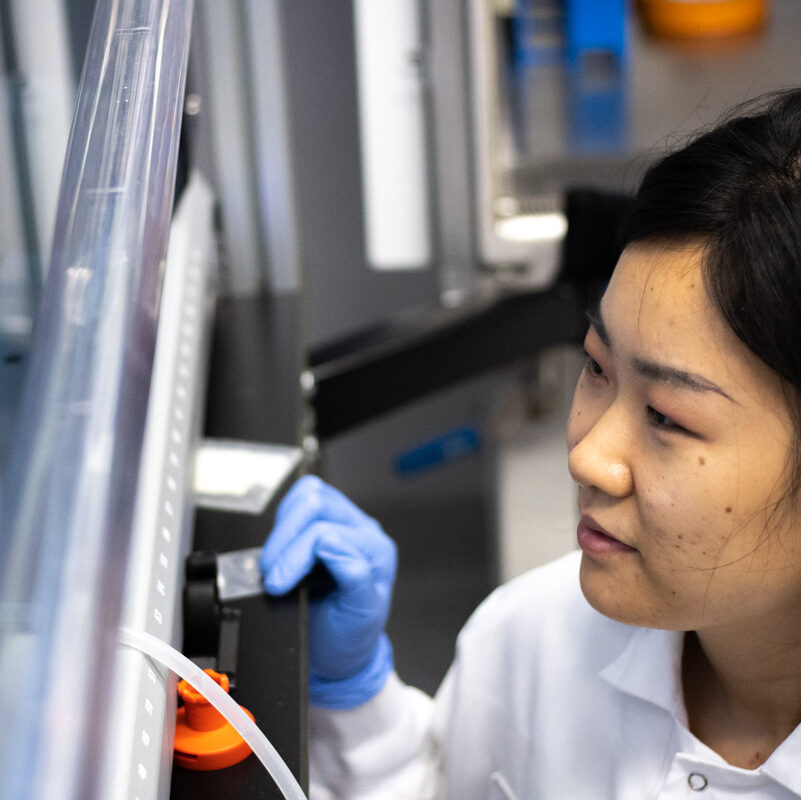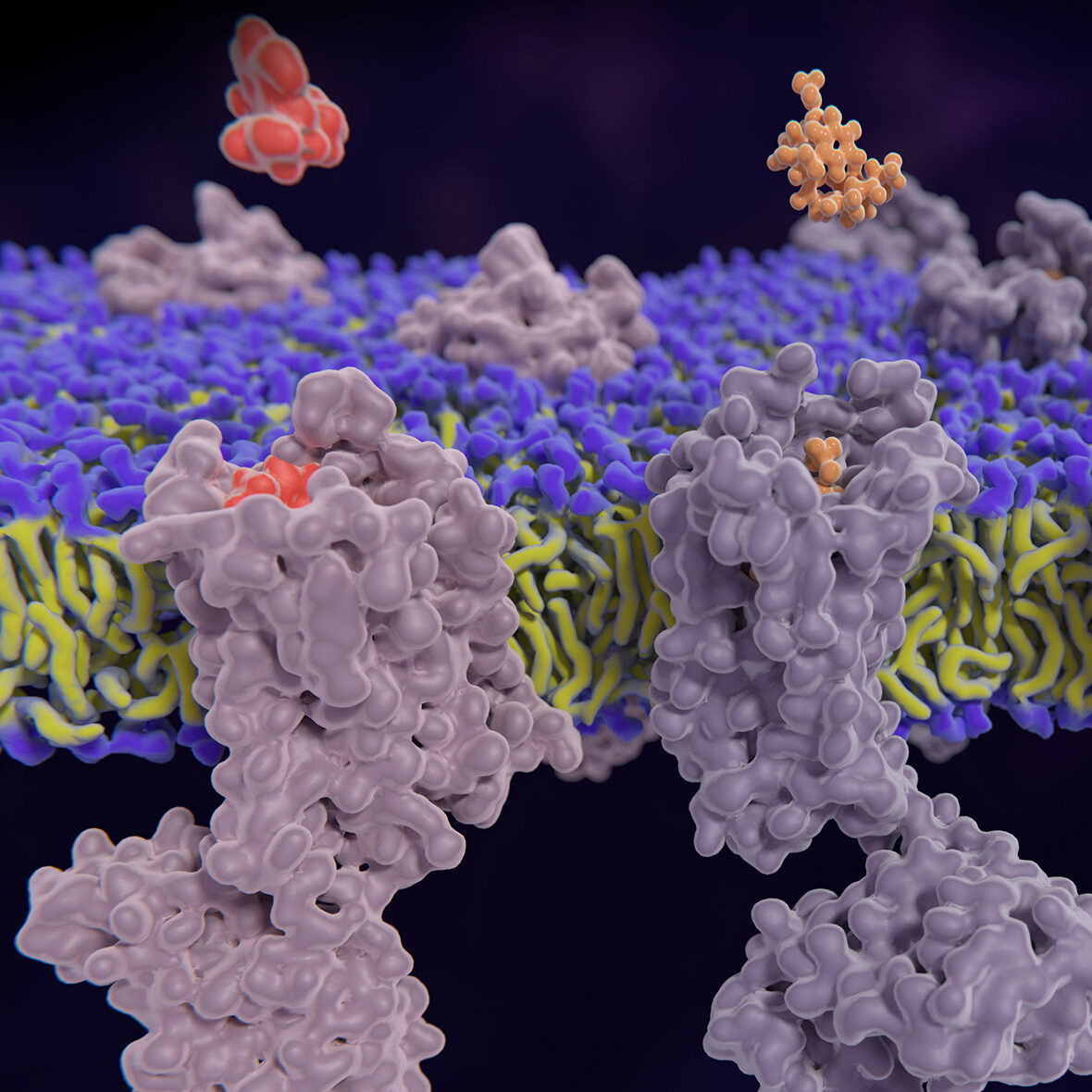Receptor Engineering at IPI
The Receptor Engineer Lab, headed by senior director of the antibody platform Rob Meijers, Ph.D., designs and creates protein tools to label, interrogate and manipulate cell surface receptors and their ligands.
The lab uses state-of-the-art structural biology tools and mammalian expression protocols to produce human and animal protein fragments that closely resemble their native state. We further engineer these fragments to probe the functional role of receptors. With our yeast display technology, we discover and produce synthetic antibodies that influence receptor conformation and ligand binding.
These antibodies offer unprecedented insights into cell signaling and homeostasis, opening new paths toward diagnostics and therapeutics.
Research expertise
We are a team of scientists with expertise in the structural biology of cell surface receptors, especially those involved in immune responses, neuronal development and signaling. Some of our accomplishments include:
- Engineering major histocompatibility complex molecules to study peptide binding.
- Designing fragments of the netrin guidance cue.
- Unraveling how netrin clusters cell surface receptors such as DCC, DSCAM and UNC5.
- Developing synthetic antibodies.
- Creating in vitro cell-based assays to label and manipulate proteins.
Lab equipment
Our lab is equipped with state-of-the-art liquid handling robots and biophysical equipment to handle large numbers of protein constructs, protein expression screens and high-throughput biophysical characterization, including:
- Beckman Coulter BioMek i7, for transfection, purification and production
- Carterra LSA, for high-throughput SPR analysis
- Dynamic Devices Lynx LM900, for BLI plates and liquid handling
- Miltenyi Biotec autoMACS, for yeast library sorting
- BD FACSMelody Cell Sorter, for yeast library sorting
- Bruker maXis II, for mass spectrometry-led quality control
- Sartorius AG Octet HTX, for BLI analysis
Antibody focus
IPI acknowledges the value of nanobodies, miniproteins and other innovative protein binders in advancing the possibilities of protein science. However, our focus for the moment is on making recombinant antibodies. We see an existing, unmet need for antibodies in basic scientific research — and that demand has not faded with the advent of other protein technologies.
Antibodies are unique in their familiarity of use, assay success rate and specificity and tightness in target binding. Drug development also continues to rely on antibodies, predominantly as protein-based therapeutics, as other protein binders tend to be immunogenic, evoking an immune response.
The problem with antibodies is cost and access. But with philanthropic support, IPI has been able to invest in the high-throughput technology necessary to make IgG recombinant antibodies and design a platform that generates high-quality, reliable antibodies. As part of our mission, we aim to make our antibodies and related protein tools accessible to the broader scientific community, so that no research or therapeutic is held back by high costs or inaccessible reagents along the way.
Current projects
Currently, the IPI Receptor Engineering Lab is using high-throughput robotics and cutting edge biophysical and molecular biology techniques to pursue three research areas: axon guidance receptors, Wnt signaling and opioid receptors.

Axon guidance receptors
Cell surface receptors play an essential role in early brain development. They prod neurons to stretch and morph, thus, synapsing with other neurons. We have characterized the players in one critical receptor pathway: netrin. Highly conserved, netrin is a chemotrophic protein that concentrates and shapes into “paths” that attract or repulse the tips of axons as they sprout from neurons. Our work has uncovered the complex workings of several key netrin receptors. We are now developing synthetic antibodies for each to dissect their various responses to netrin’s selective clustering and patterning, triggering cell migration or apoptosis.
Wnt signaling
Wnt proteins create an essential molecular switch in homeostasis and proliferation, governing stem cell maintenance, axon guidance and tumor growth. The amino acid sequences of Wnt proteins and their receptors are evolutionarily conserved, creating challenges in discovering antibodies through traditional animal immunization.
In response to the frustrating lack of antibodies in this crucial research area, we have initiated a campaign to discover synthetic antibodies that target all Wnt signaling pathway components. We deploy high-throughput protein production and yeast display technologies to discover and develop rare antibodies to this tough-to-target family of signaling molecules.


Opioid receptors
Opioid receptors are G protein-coupled receptors that mediate pain relief in injured and inflamed tissue. Sadly, the receptors also unleash adverse consequences in healthy tissue, including the slowdown of respiration and sedation of the brain. The side effects of opioids sit at the heart of a long-lasting and ever-growing opioid crisis worldwide.
To address this problem, we obtained funding from the National Science Foundation to develop conformation-specific synthetic antibodies directed at opioid receptors. When a tissue becomes inflamed, opioid receptors respond by changing their conformation. Our goal is to create and wield antibodies that lock opioid receptors into specific states. These tools will allow us to probe opioid signaling mechanisms and speed the development of non-addictive narcotics.
Key publications
Kahn, R. A., Virk, H., Laflamme, C., Houston, D. W., Polinski, N. K., Meijers, R., Levey, A. I., Saper, C. B., Errington, T. M., Turn, R. E., Bandrowski, A., Trimmer, J. S., Rego, M., Freedman, L. P., Ferrara, F., Bradbury, A. R. M., Cable, H., & Longworth, S. (2024). Antibody characterization is critical to enhance reproducibility in biomedical research. eLife, 13, e100211. https://doi.org/10.7554/eLife.100211
Hao, Y., Yan, J., Fraser, C., Jiang, A., Anuganti, M., Zhang, R., Lloyd, K., Jardine, J., Coppola, J., Meijers, R., Li, J., & Springer, T. A. (2024). Synthetic integrin antibodies discovered by yeast display reveal αV subunit pairing preferences with β subunits. mAbs, 16(1), 2365891. https://doi.org/10.1080/19420862.2024.2365891
Ghosh, A., Yang, C., Lloyd, K., & Meijers, R. (2024). High-Throughput Protein Expression Screening of Cell-Surface Protein Ectodomains. Methods in molecular biology (Clifton, N.J.), 2810, 301–316. https://doi.org/10.1007/978-1-0716-3878-1_19

